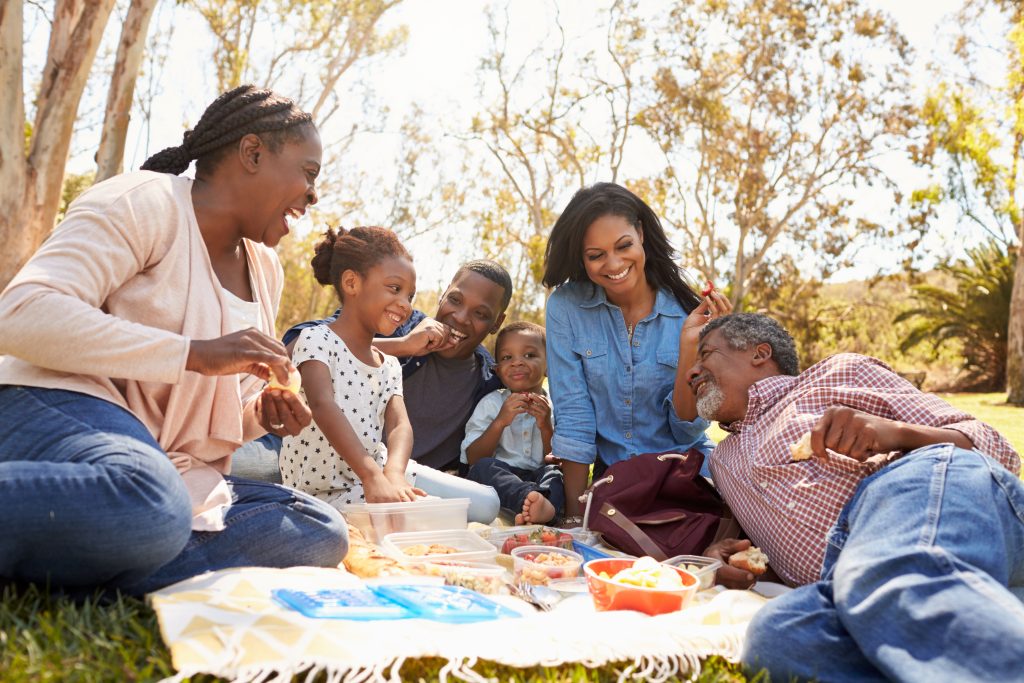Picnic Moments Add Value to Relationships

4 ways to ensure you aren’t picnicking alone
Summer invokes euphoric feelings of relaxation and fun. Children can’t wait for the last day of school so they can sleep in, play with friends and go on vacation. It’s common to visit a nearby park on a warm summer day and see families or friends sitting on a large blanket with picnic baskets and coolers, enjoying sandwiches, fruit and sweet tea while shooing the flies away.
Such simple moments often prove to be memorable. They are the moments when nothing else matters except the people in front of you and where nothing specifically profound or life altering happens, but that’s the point.
Life doesn’t have to be filled with adrenaline pumping thrills to be memorable. Sometimes it’s the uncomplicated purity of a picnic that sears an unforgettable feeling into your soul. Relationships are unique that way. It’s the unexpected, partially planned efforts to connect with another person that become lifelong memories.
Yet, we often allow the routine and mundane to suppress our intentional availability for deep connection.
Whether you care to admit it or not, you tend to imitate the people you are around the most. Motivational speaker Jim Rohn said you are the average of the five people you spend the most time with, but this isn’t entirely accurate. Recent studies have shown that you’re not just influenced by your friends. You are influenced by your friends’ friends.
In a 30-year study, they found that if a close friend gains weight, you are 45% more likely to gain weight in the next 2-4 years. But here is what’s crazy. You are 20% more likely to gain weight if your friend’s friend gains weight (Christakis and Fowler).

So, you’re not just the average of your friends, you are the average of your friend’s friends and their friends. Research shows if your friends are happy, you are happier. But even if your friend’s friend is happy, you’ll be 6% happier (Christakis and Fowler).
When taking this into account, the impact and weight of the “one-another’s” in scripture become far more noticeable. You may be doing great, but if your friend isn’t doing great, it can negatively affect the collective group, not just one person. This doesn’t mean you’re not responsible for your own emotions, actions and efforts. It simply means relationships matter, and if you have a picnic with the wrong people, you may find yourself hating picnics, hating friendships, even hating the fact that you tried. What was supposed to be memorable and delightful has now turned malicious and divisive.
This fear keeps us in a cocoon of selfish introspection. Are you afraid your effort to connect with someone will leave you rejected, defeated and hopeless? Or perhaps you’ve tried before and got burned. They betrayed your trust or hurt you physically or emotionally, but you CAN’T give up. You’ve got to try again, to hope again.
Life unshared is only half enjoyed.
Relationships matter, friendships matter. Just a quick search of the scriptures and you’ll find:
- Proverbs 17:17 NIV– A friend loves at all times and a brother is born for a time of adversity.
- John 15:13 NLT – There is no greater love than to lay down one’s life for one’s friends.
Even Jesus understood the meaning of friendship and not just servitude.
- He said, “I no longer call you servants, because a servant does not know his master’s business. Instead, I have called you friends, for everything that I learned from my Father I have made known to you” (John 15:15 NIV).
So how in the world of overbooked schedules and incessant phone notifications, are you supposed to build deep, meaningful relationships? How are you supposed to stop the never-ending chaos carousel long enough to talk about something besides your kids, your job or your depressing trip to the gas pump?
Three words: value, moments and boundaries. In this blog series, we’ll focus on adding value.
First, you have to commit to adding value to other people. In his evergreen book, How to Win Friends and Influence People, Dale Carnegie notes, “You can make more friends in two months by becoming interested in other people than you can in two years by trying to get other people interested in you.”
4 Ways to Ensure You Aren’t Picnicking Alone
Everyone loves the person who helps them succeed. If you want to build deep meaningful relationships this summer, add value to someone else’s life. How do you do that? It’s easier than you may think.
- Listen.
Nothing makes a person feel appreciated more than when someone takes time to actively listen, dedicating all your focus, attention and energy to what the other person is saying.

Most of the time we don’t listen to understand, we listen to respond.
- Fight the urge to make it about you.
- Listen to their words.
- Observe their emotions.
- Empathize with them.
- Provide feedback when appropriate.
When people feel heard, they feel valued. If you can fight the temptation to shift the spotlight to yourself, you’ll reap the rewards. As noted above, they’ll be influenced by you and will begin to behave like you. In no time at all, they’ll be actively listening to you, and you’ll have developed a mutually edifying friendship.
2. Help.
Helping someone doesn’t have to take a lot of time, energy or physical exertion. For some reason, when we think about helping, we always think about moving day. We envision lifting dressers and breaking our backs hauling insanely heavy sofa beds. But helping can look much simpler. Helping may mean:
- A 15-minute trip out of your way to pick up some eyeglasses for them.
- A text message reminding them to pick up their child at school.
- Sending an encouraging Scripture when they are having a bad day.
3. Give a gift.
Anyone who has a love language of gifts will tell you the gift doesn’t have to be expensive. It just has to be thoughtful. In his book, Giftology, John Ruhlin says, “It’s not the thought that counts, but it’s the thoughtful thought that counts.” For example:
- Give a young couple a date night by babysitting their kids for a couple of hours.
- Treat someone to coffee or give them a gift card to their favorite restaurant.
Proverbs 18:16 says, “A gift opens the way and ushers the giver into the presence of the great.” A thoughtful gift at the right time could lead to a fruitful relationship.
4. Find the new.
We are creatures of habit, but sometimes those habits are boring, exhausting and detrimental to our well-being. In fact, 61% of Americans are trying to break unhealthy pandemic habits (Black 2021).

Adding value to someone may mean introducing them to something new.
- Invite them to an escape room, visit a museum and read every placard.
- Take a road trip.
- Try a different restaurant offering food they’ve never tried.
Even if they don’t like the experience, they’ll remember the effort, the thought, and the experience. You can be sure even if it’s a subpar experience, they’ll talk about it the next day at their workplace or mention it to their family members. You may find them suggesting an activity for the next outing.
It may feel counterintuitive, but if you want a friend, you must first commit to being a friend. Proverbs 18:24 (NKJV) says it this way, “A man who has friends must himself be friendly.”
There are no shortcuts to meaningful relationships, and while everyone needs alone time, no one wants to spend their life picnicking alone.
Click here for our Free Summer Resources for Families.
See more of our family blogs for the summer – check out “A Beautiful Metamorphosis.”
Sources:
Christakis, Nicholas A. M.D., Ph.D., M.P.H., and Fowler, James H. Ph.D. “The Spread of Obesity in a Large Social Network over 32 Years.” The New England Journal of Medicine. Retrieved 5/24/2022 from https://www.nejm.org/doi/full/10.1056/NEJMsa066082
Christakis, Nicholas A. M.D., Ph.D., M.P.H., and Fowler, James H. Ph.D. “Dynamic spread of happiness in a large social network: longitudinal analysis over 20 years in the Framingham Heart Study.” BMJ 2008;337:a2338. Retrieved 5/24/2022 from https://www.bmj.com/content/337/bmj.a2338
Black, Michelle Lambright. 26 Jul 2021. “61% of Americans Trying to Break Unhealthy Pandemic Habits.” Value Penguin. Retrieved 5/24/2022 from https://www.valuepenguin.com/pandemic-habits-survey
